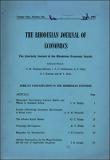| dc.contributor.author | Weinrich, A.K.H. | |
| dc.coverage.spatial | Zimbabwe | en |
| dc.date.accessioned | 2015-08-18T09:12:11Z | |
| dc.date.available | 2015-08-18T09:12:11Z | |
| dc.date.issued | 1975-03 | |
| dc.identifier.citation | Weinrich, A.K.H. (1975) Factors Influencing Economic Development in Rural Areas. Rhodesia Journal of Economics (RJE), vol. 9, no.1, (pp. 7-15). UZ (formerly University of Rhodesia), Harare (formerly Salisbury): RES. | en |
| dc.identifier.uri | https://opendocs.ids.ac.uk/opendocs/handle/20.500.12413/6775 | |
| dc.description | A RJE lecture article on rural development in the then Rhodesia (now Zimbabwe.) | en |
| dc.description.abstract | I have just published a book : “African Farmers in Rhodesia” (International African Institute, London, 1975) which deals with the very topic I have been asked to speak to you about. I shall therefore give you in this lecture the conclusions I arrived at after studying for several years various agricultural communities.
It is seldom possible for sociologists to carry out experiments with the same degree of accurancy as can physical scientists; the closest we can come to a laboratory-like situation is to carry out controlled observation. This is the method I used. I chose two tribal trust lands, two purchase areas and two irrigation schemes in the same tribal area and in the same ecological region of Rhodesia so that all extraneous factors which might affect productivity were held constant. Within this framework I looked for one successful and one unsuccessful agricultural community of each type. This strict selection was hampered in the case of one irrigation scheme, because Government did not give me access to the scheme I had selected, claiming that there was political unrest in the area, and suggested another scheme to me. This suggested scheme. Chikwarakwara at the Limpopo river, was inhabited predominantly by Shangaan and its natural region also was very different from that of the other communities in the centre of Rhodesia. However, by the time I studied this scheme I had established that these differences were not the significant factors influencing productivity. The communities chosen are the following; Chilimanzi and Victoria tribal trust lands, Zvinyaningwa and Tokwe purchase areas and Gove and Chikwarakwara irrigation schemes. | en |
| dc.language.iso | en | en |
| dc.publisher | Rhodesian Economic Society (RES). University of Rhodesia (now University of Zimbabwe.) | en |
| dc.rights.uri | http://creativecommons.org/licenses/by-nc-nd/3.0/ | en |
| dc.subject | Economic Development | en |
| dc.subject | Rural Development | en |
| dc.title | Factors Influencing Economic Development in Rural Areas | en |
| dc.type | Article | en |
| dc.rights.holder | University of Zimbabwe (UZ) (formerly University College of Rhodesia) | en |


